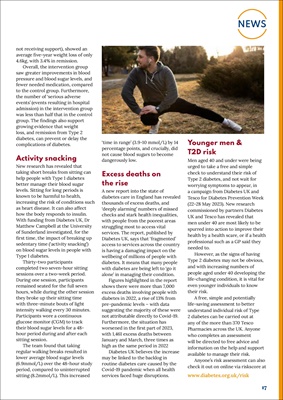
17
NEWS
not receiving support), showed an
average five-year weight loss of only
4.6kg, with 3.4% in remission.
Overall, the intervention group
saw greater improvements in blood
pressure and blood sugar levels, and
fewer needed medication, compared
to the control group. Furthermore,
the number of 'serious adverse
events' (events resulting in hospital
admission) in the intervention group
was less than half that in the control
group. The findings also support
growing evidence that weight
loss, and remission from Type 2
diabetes, can prevent or delay the
complications of diabetes.
Activity snacking
New research has revealed that
taking short breaks from sitting can
help people with Type 1 diabetes
better manage their blood sugar
levels. Sitting for long periods is
known to be harmful to health,
increasing the risk of conditions such
as heart disease. It can also affect
how the body responds to insulin.
With funding from Diabetes UK, Dr
Matthew Campbell at the University
of Sunderland investigated, for the
first time, the impact of breaking up
sedentary time ('activity snacking')
on blood sugar levels in people with
Type 1 diabetes.
Thirty-two participants
completed two seven-hour sitting
sessions over a two-week period.
During one session, participants
remained seated for the full seven
hours, while during the other session
they broke up their sitting time
with three-minute bouts of light
intensity walking every 30 minutes.
Participants wore a continuous
glucose monitor (CGM) to track
their blood sugar levels for a 48-
hour period during and after each
sitting session.
The team found that taking
regular walking breaks resulted in
lower average blood sugar levels
(6.9mmol/L) over the 48-hour study
period, compared to uninterrupted
sitting (8.2mmol/L). This increased
'time in range' (3.9-10 mmol/L) by 14
percentage points, and crucially, did
not cause blood sugars to become
dangerously low.
Excess deaths on
the rise
A new report into the state of
diabetes care in England has revealed
thousands of excess deaths, and
'deeply alarming' numbers of missed
checks and stark health inequalities,
with people from the poorest areas
struggling most to access vital
services. The report, published by
Diabetes UK, says that 'fragmented'
access to services across the country
is having a damaging impact on the
wellbeing of millions of people with
diabetes. It means that many people
with diabetes are being left to 'go it
alone' in managing their condition.
Figures highlighted in the report
shows there were more than 7,000
excess deaths involving people with
diabetes in 2022, a rise of 13% from
pre-pandemic levels - with data
suggesting the majority of these were
not attributable directly to Covid-19.
Furthermore, the situation has
worsened in the first part of 2023,
with 1,461 excess deaths between
January and March, three times as
high as the same period in 2022
Diabetes UK believes the increase
may be linked to the backlog in
routine diabetes care caused by the
Covid-19 pandemic when all health
services faced huge disruptions.
Younger men &
T2D risk
Men aged 40 and under were being
urged to take a free and simple
check to understand their risk of
Type 2 diabetes, and not wait for
worrying symptoms to appear, in
a campaign from Diabetes UK and
Tesco for Diabetes Prevention Week
(22-28 May 2023). New research
commissioned by partners Diabetes
UK and Tesco has revealed that
men under 40 are most likely to be
spurred into action to improve their
health by a health scare, or if a health
professional such as a GP said they
needed to.
However, as the signs of having
Type 2 diabetes may not be obvious,
and with increasing numbers of
people aged under 40 developing the
life-changing condition, it is vital for
even younger individuals to know
their risk.
A free, simple and potentially
life-saving assessment to better
understand individual risk of Type
2 diabetes can be carried out at
any of the more than 370 Tesco
Pharmacies across the UK. Anyone
who completes an assessment
will be directed to free advice and
information on the help and support
available to manage their risk.
Anyone's risk assessment can also
check it out on online via riskscore at
www.diabetes.org.uk/risk